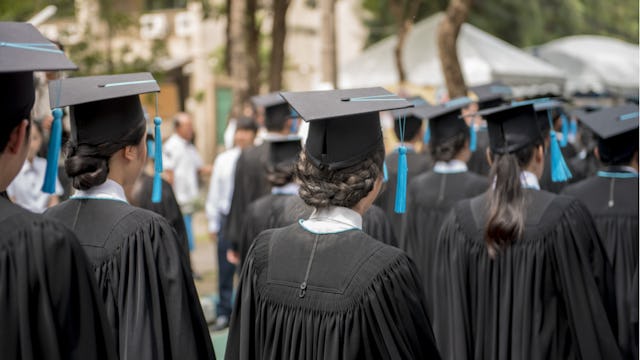Chicago Public Schools To Withhold Diplomas Unless Students Have Post-Graduate Plans

Students need proof of plans or they won’t graduate
Well, this seems problematic.
Beginning with the class of 2020, seniors in Chicago’s public school system will not be given their high school diplomas unless they provide proof of a post-graduate plan, such as a college acceptance letter or enrollment in the military. But what is being pushed as a motivational initiative to get kids to make concrete plans for their futures ignores a host of issues that make an already difficult path to graduation for some teens even more challenging and, indeed, demoralizing.
The plan, which is part of Chicago’s Learn, Plan, Succeed initiative, has been shepherded by Mayor Rham Emanuel, who believes that the new requirement will help kids think seriously about life after high school: “We are going to help kids have a plan because they’re going to need it to succeed,” he said. “You cannot have kids think that 12th grade is done.” The new requirement would accept the following: a letter of acceptance to college, an offer of employment, enrollment in the military, or acceptance into a trade program or gap year program.
“Just like you do with your children, college, post-high school, that is what’s expected,” Emanuel said at a press conference announcing the plan in April. “If you change expectations, it’s not hard for kids to adapt.”
See, Chicago public school parents, if you would just expect your kids to do something after high school then they would have no trouble following your lead and choosing to get a job or go to college. Except that this issue is about far more than proper planning; what Emanuel’s plan ignores is the overwhelming role that class, race, family, and geography (to name just a few factors) play in one’s education.
You know, the small stuff.
Monique Judge of The Root laid out one part of the problem this way: “…a requirement like this could disproportionately affect black and brown students in a negative way. For a lot of them, going to college is cost-prohibitive. Even applying to college can be cost-prohibitive; college applications aren’t cheap…So, for the students who can’t afford either college or the application, the push is then to funnel them into service in the U.S. military, something that is already done at a disproportionate rate.”
And if the only option left for those kids is to get a job by graduation, then you’re going to have even more kids leaving high school without the diplomas they worked for because jobs aren’t exactly a cinch to get. High school seniors — particularly in some of Chicago’s school districts — aren’t beating away offers of employment, Rahm.
There’s also the matter of paying for the staff and resources that will be needed if the initiative is going to work because right now, Emanuel appears to be treating this the way everyone who’s bad with money does: let’s just do it and worry about paying for it later. Chicago public schools and local community colleges aren’t exactly rolling in money — according to The Washington Post, “the 381,000-student district laid off more than 1,000 teachers and staff members in 2016, and it is in such difficult financial straits that it struggled to keep its doors open for the final weeks of the school year.” Doesn’t sound like an ideal time to create a requirement that will call for far more high school counselors, some of whom already have caseloads of over 400 kids who they help with everything from school attendance to coping with street violence.
Another interesting wrinkle is that in Chicago every student who graduates from high school is automatically accepted to the City Colleges of Chicago community college system (if there’s room), which also offers a scholarship program giving every student who applies to it free tuition, books, and school supplies (if there’s money). That sounds great. That also sounds like an opportunity a lot more students will take advantage of under Learn, Plan, Succeed, which Chicago’s already financially strapped community colleges should have no problem paying for.
It would be great to say the Chicago Public School’s plan is a good idea that was just poorly planned, but it actually seems like a terrible idea that will also be a disaster. In an op-ed about the plan for The Chicago Sun-Times, former CPS educator Gina Caneva wrote, “A requirement without investment is not reform. It is more of a political statement than an educational game-changer.” And that what is that political statement? It appears to be “let’s get tough on the lazy and unmotivated poor.” As Judge writes at the end of her article, “this rule seems to be…aimed at targeting a specific portion of the population.” It is. And, as usual, because dealing with the real issues is too hard, it will only make things worse.